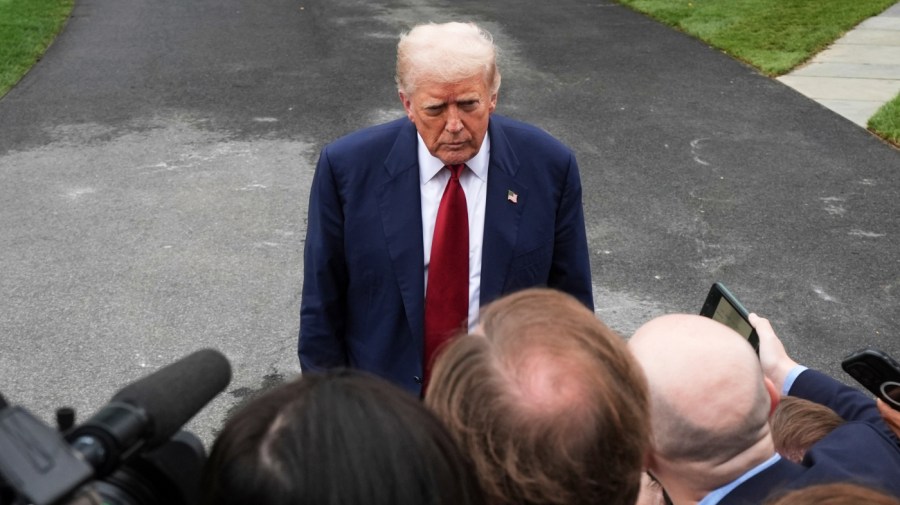Trump’s odds of winning or losing his multitude of battles

In picking fights and waging wars on multiple fronts, President Trump should heed the advice of Britain’s greatest sailor and naval hero Lord Horatio Nelson: Only a fool or a stupid ship’s captain would ever fight a fort.
While immobile, unlike ships, forts were better defended and protected. And forts were more easily reinforced, rearmed and resupplied by land than ships at sea, which then had to find suitable ports.
Trump is not at sea except in the minds of his many critics, yet he has joined several simultaneous battles against forts.
He has given Russia no more time beyond Monday’s 10-day deadline to end the war in Ukraine. Former Russian President and Prime Minister Dimitri Medvedev has threatened nuclear war if Trump is not careful. In that regard, Russia is a formidable fort armed with nuclear weapons equal to America’s.
Trump started a global trade war with his announcement Friday of new tariffs, having struck a deal with the European Union while still negotiating with China.
He seems to have picked a fight with Israeli Prime Minister Benjamin Netanyahu over relieving extreme starvation in Gaza, after having turned a Nelsonian blind eye toward an estimated 61,000 Palestinian deaths.
And he surely is at war at home against so-called woke law firms and universities and, remarkably, a more than significant part of his MAGA base over refusing to come clean about his relationship with the deceased sexual predator Jeffrey Epstein.
Whether Trump will prevail or fail in all, some or none of these battles will largely determine his administration’s future and will almost certainly impact congressional elections in 2026 and the presidential vote in 2028, for which he is legally prevented from running.
For most mere mortals, bookies would set the odds of failing or losing at least one of these battles as very low. Running the deck, however, would recoup a fortune in bets.
Yet Trump’s history has reversed all the odds against him. This makes any seemingly rational bet to the contrary exceedingly dumb. In this ability to overcome setbacks that would crush most people, Trump made Bill Clinton’s reign as the “The Comeback Kid” seem both short and trivial. Will that luck hold out?
War with Russia will not happen. Putin, however, will not be impressed or moved by the threat to force negotiations by imposing new sanctions or deploying two American nuclear submarines that somehow will annoy or worry Russia sufficiently to abandon its efforts.
At the moment, while the war in Ukraine will not be fought to the last Russian, there are no compelling facts or arguments to convince Putin he is losing or needs to withdraw his forces. Quite the contrary.
Similarly, in Gaza, Netanyahu’s actions will determine America’s. The relationship with Israel has grown so close over the decades since the 1956 and 1967 Arab-Israeli wars that the U.S. no longer tries or considers not giving Israel basically what it needs or demands.
What could happen in these conflicts in Ukraine and Gaza, as with the Houthis, is that the U.S. withdraws and the situation reverts back to the pre-war days.
The global trade war is different. The administration asserts that tariffs will not raise inflation and will generate greater economic growth. This argument is the equivalent of the ship commanded by Nelson’s dim witted captain.
Other states will react. The World Trade Organization and its agreed upon principles will become cannon fodder. Even though imports comprise only about 11 percent of U.S. total GDP, the effects of tariffs will be much greater.
Unlike Gaza and Ukraine, of which Trump can wash his hands, the economy is not something that can be discarded like a used tissue. Trump will have to do something to explain or cover up any misjudgments.
The only way for that to happen comes from the Trump playbook: Call the bad data “fake news,” dissemble and stall — or cling to the belief that tariffs are working, despite all the contradictory evidence.
Ironically, Epstein may be the problem that simply will not disappear — the fort that ultimately wins. Trump is trapped by his promise to release all the Epstein files. Suppose there are none and nothing more to release? Or suppose the files contain truly damaging revelations about Trump or his circle? There may be no way out.
One conclusion is clear: The fewer fights picked, the better. And the chances of winning many are not odds most people would accept.
Harlan Ullman, Ph.D., is UPI’s Arnaud deBorchgrave Distinguished Columnist, a senior advisor at the Atlantic Council, the chairman of two private companies and the principal author of the doctrine of shock and awe. He and former United Kingdom Defense Chief David Richards are the authors of a forthcoming book on preventing strategic catastrophe.